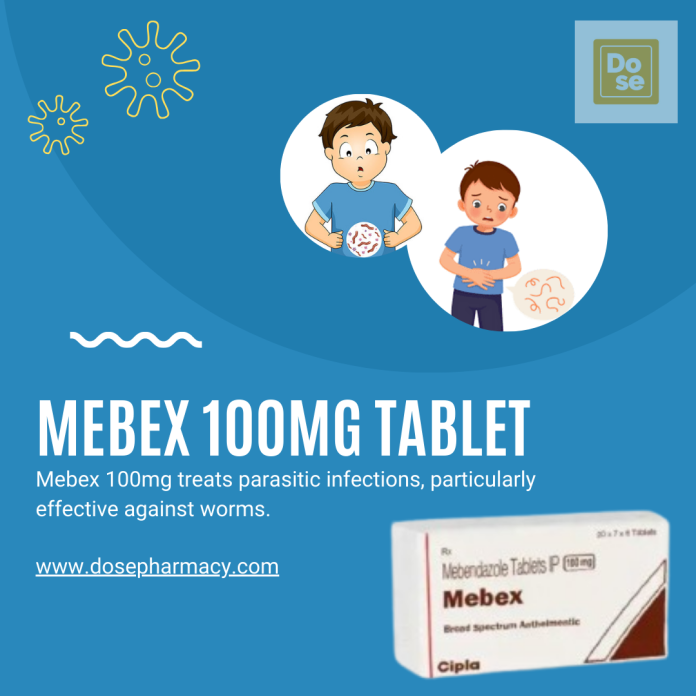Intestinal worm infections remain a major public health concern, particularly in developing countries where sanitation and hygiene may be limited. These parasitic infections, caused by various types of helminths (worms), can affect both children and adults, leading to discomfort, poor nutrient absorption, and long-term health complications if left untreated. Fortunately, modern medicine has provided effective remedies for these conditions, and among the most trusted treatments is Mebendazole over The Counter.
Mebendazole is a widely used anti-parasitic medication known for its effectiveness, safety, and ease of use. This article explores everything you need to know about Mebendazole—its mechanism of action, uses, dosage, safety profile, and more.
What Is Mebendazole?
Mebendazole is a broad-spectrum anthelmintic medication that kills or inhibits the growth of intestinal worms. It is most commonly used to treat:
- Pinworm (Enterobiasis)
- Roundworm (Ascariasis)
- Whipworm (Trichuriasis)
- Hookworm (Ancylostomiasis and Necatoriasis)
Mebendazole works by disrupting the energy production of worms. It prevents the uptake of glucose and other nutrients needed for their survival, ultimately leading to their death and elimination from the body through natural bowel movements.
Why Is Mebendazole So Widely Trusted?
1. Proven Efficacy
Mebendazole has been used for over four decades and has consistently shown high cure rates for a wide range of intestinal worm infections. It is often recommended by the World Health Organization (WHO) and Centers for Disease Control and Prevention (CDC) in deworming programs.
2. Well-Tolerated
The drug is well-tolerated in both children and adults, with minimal side effects. Its safety profile makes it ideal for mass administration, especially in areas with a high prevalence of parasitic infections.
3. Easy Dosing
Mebendazole is often available as a single-dose treatment, especially for pinworms, making it convenient and increasing patient compliance. It also comes in chewable tablet and suspension form, which is particularly useful for children.
4. Cost-Effective
Compared to other anthelmintics, Mebendazole is affordable and easily accessible, making it a practical choice for large-scale deworming efforts.
How Mebendazole Works
Mebendazole inhibits the function of microtubules in parasitic worms by binding to a protein called β-tubulin. This action stops the parasites from absorbing glucose and storing energy as glycogen. Without energy, the worms die within a few days and are expelled in the feces.
It is poorly absorbed into the bloodstream, which means its effects are localized primarily in the gastrointestinal tract—where the worms reside—reducing the risk of systemic side effects.
Common Uses of Mebendazole
1. Pinworm Infections
Pinworms are highly contagious and common among children. Mebendazole is the treatment of choice and is usually given in a single 100 mg dose, repeated after two weeks to prevent reinfection.
2. Roundworms and Whipworms
These parasites are more prevalent in tropical and subtropical regions. Mebendazole is administered as a 100 mg dose twice daily for three days to ensure full eradication.
3. Hookworms
Hookworms can cause anemia and malnutrition. A similar three-day dosing regimen is usually effective.
4. Mass Deworming Campaigns
In areas with high rates of parasitic infections, Mebendazole is used in preventive public health campaigns to improve the general well-being of populations, particularly school-aged children.
Dosage Guidelines
| Condition | Recommended Dose |
|---|---|
| Pinworm (Enterobiasis) | 100 mg once; repeat in 2 weeks if necessary |
| Roundworm/Whipworm | 100 mg twice daily for 3 days |
| Hookworm | 100 mg twice daily for 3 days |
| Children (over 1 year) | Same as adults; pediatric suspension available |
Note: Dosage may vary depending on medical advice and specific formulations.
Safety and Side Effects
Common Side Effects (usually mild and temporary):
- Stomach pain
- Gas or bloating
- Diarrhea
- Nausea
Rare Side Effects:
- Rash or itching
- Dizziness
- Hair loss (with prolonged use)
- Liver enzyme elevation
Mebendazole is not recommended during pregnancy, especially in the first trimester, unless the potential benefits outweigh the risks. It should also be used with caution in individuals with liver disease.
Drug Interactions
Mebendazole has minimal drug interactions but may interact with:
- Cimetidine (used for ulcers or acid reflux)
- Metronidazole (risk of Stevens-Johnson syndrome)
Always inform your doctor of any other medications you’re taking.
Reinfection and Prevention
One of the challenges of treating intestinal worms is reinfection, especially in crowded or unhygienic environments. Reinfection can occur when eggs from contaminated hands, clothes, or surfaces are ingested.
Tips to Prevent Reinfection:
- Wash hands regularly, especially after using the toilet
- Keep fingernails short and clean
- Wash bedding, clothing, and towels in hot water
- Avoid walking barefoot in contaminated soil
- Treat all family members if one person is infected
In some high-risk areas, regular deworming every 6 months may be advised.
Mebendazole in Global Health
Mebendazole is included in the WHO Model List of Essential Medicines, highlighting its importance in basic healthcare systems. It plays a critical role in neglected tropical disease (NTD) programs, especially for soil-transmitted helminthiases (STH).
Large-scale deworming campaigns using Mebendazole have shown improvements in:
- Nutritional status
- School attendance and performance
- Physical development in children
Conclusion
Mebendazole remains one of the most trusted, safe, and effective treatments for intestinal worms worldwide. Its broad-spectrum activity, ease of use, and affordability make it a cornerstone in both individual therapy and public health deworming programs.
Whether you’re a parent managing a pinworm infection in your child or a healthcare provider in a rural clinic, Mebendazole offers a reliable solution. With appropriate hygiene and preventive measures, it helps break the cycle of infection and improves the quality of life for millions around the globe.

